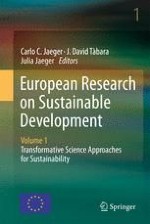2011 | OriginalPaper | Buchkapitel
Pragmatism and Pluralism: Creating Clumsy and Context-Specific Approaches to Sustainability Science
verfasst von : Paul M. Weaver
Erschienen in: European Research on Sustainable Development
Verlag: Springer Berlin Heidelberg
Aktivieren Sie unsere intelligente Suche, um passende Fachinhalte oder Patente zu finden.
Wählen Sie Textabschnitte aus um mit Künstlicher Intelligenz passenden Patente zu finden. powered by
Markieren Sie Textabschnitte, um KI-gestützt weitere passende Inhalte zu finden. powered by
